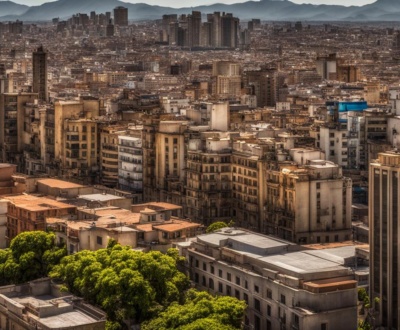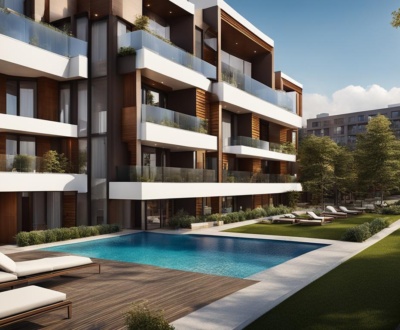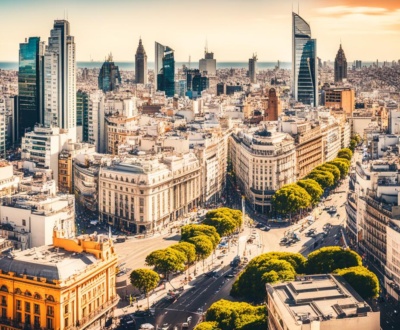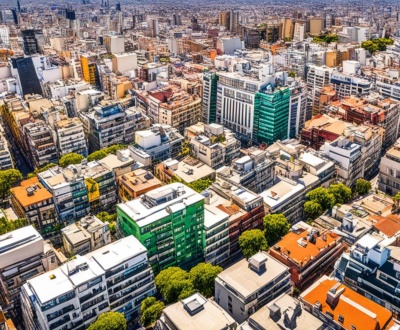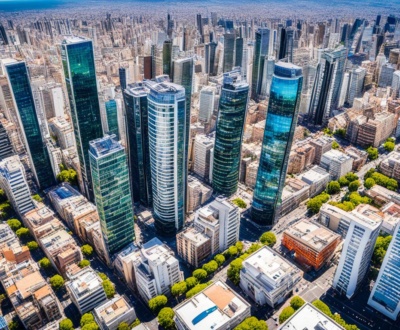Welcome to our comprehensive guide on investing in Argentina property for expats. If you’re considering purchasing real estate in Argentina, this is the ultimate resource for you. We will provide valuable insights into the Argentina property market analysis, real estate trends Argentina, and Argentina real estate statistics.
Argentina is renowned for its captivating landscapes, vibrant cities, and rich culture, making it an attractive destination for expats looking to invest in real estate. In this guide, we will walk you through everything you need to know before purchasing property in Argentina, including the legal requirements, types of properties available, and the current market trends.
Whether you’re a seasoned investor or a first-time buyer, gaining a deep understanding of the local market is crucial for a successful investment. Rest assured, we have you covered with comprehensive analysis and key statistical data to help you make informed decisions.
Can Expats Purchase and Own Property in Argentina?
Yes, foreigners can buy and own property in Argentina. Foreigners have the same civil rights as Argentine citizens, including the right to own real estate. However, there are certain restrictions on the acquisition of rural land by foreigners, as stated in Ley N° 26737. Foreigners can buy land in Argentina if they can prove it benefits the local community, such as hiring local workers and using local materials. A special certificate from the National Rural Land Registry is required for buying land as a foreigner.
When it comes to purchasing property in Argentina, expats have the same rights as Argentine citizens. This allows them to explore various investment opportunities and fulfill their dreams of owning a piece of real estate in this beautiful country. However, it’s important to understand that there are specific regulations and restrictions in place, especially when it comes to buying rural land. These regulations are intended to safeguard the interests of the local community and ensure responsible ownership.
Under Ley N° 26737, foreigners who wish to buy rural land in Argentina must demonstrate how their acquisition benefits the local community. This could include factors such as employing local workers or utilizing local resources. By doing so, expats can contribute to the development and sustainability of the region in which they choose to invest.
“Foreigners can buy land in Argentina if they can prove it benefits the local community, such as hiring local workers and using local materials.”
In order to facilitate this process, expats must obtain a special certificate from the National Rural Land Registry. This certificate serves as proof that the purchase aligns with the legal requirements and is in the best interest of the local community. It is important for expats to be aware of these regulations and to consult with legal experts who specialize in real estate transactions to ensure compliance and a smooth buying process.
Buying Land as a Foreigner in Argentina
Foreigners interested in buying land in Argentina need to be aware of certain restrictions and regulations. The Ley 26.737 in Argentina prohibits foreigners from purchasing land with significant water sources or in border security zones. Additionally, there are limitations on the amount of rural land that foreigners can own. According to the law, foreigners are restricted to owning a maximum of 15% of all rural land in Argentina and cannot possess more than 1,000 hectares in certain areas.
However, there are exceptions to these restrictions. Foreigners who have lived in Argentina for a specific period of time or have Argentine children may be eligible for different property ownership rights. It is essential to consult with legal experts and the relevant authorities to understand the specific regulations and exceptions that may apply in your situation.
Before purchasing land in Argentina, it is also necessary to obtain a special certificate from the National Rural Land Registry. This certificate confirms that the buyer is eligible to acquire the land as a foreigner. It is important to note that there is a fee associated with the certification process.
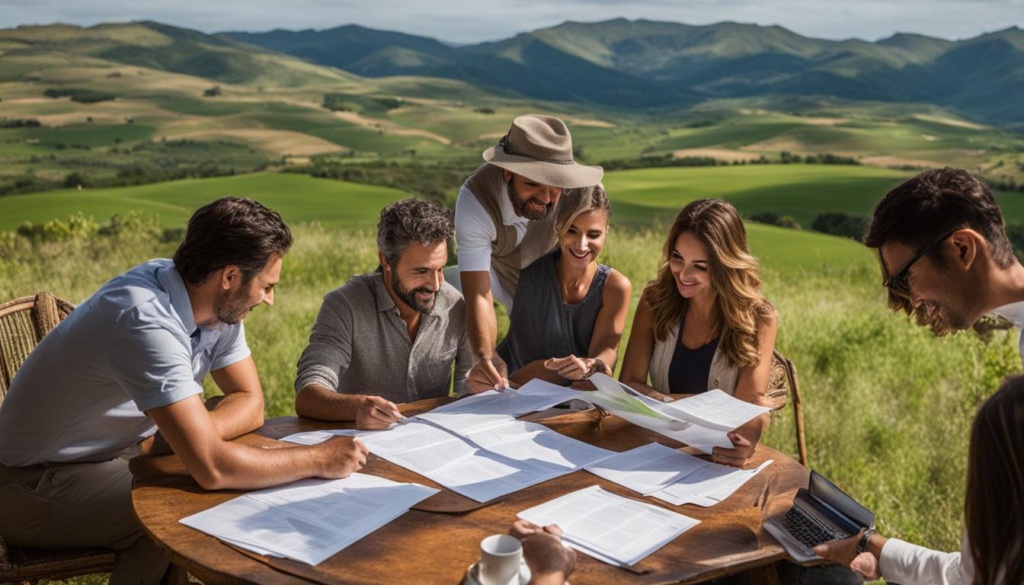
| Restrictions | Foreign Land Ownership Limit |
|---|---|
| Land with significant water sources or in border security zones | Prohibited for foreign ownership |
| All rural land in Argentina | Maximum of 15% ownership limit for foreigners |
| Certain areas in Argentina | Cannot own more than 1,000 hectares |
Can You Become a Resident in Argentina by Owning a Property?
Owning a property in Argentina does not grant automatic residency. However, foreigners can apply for temporary residence as investors by presenting an investment project to the Dirección Nacional de Migraciones. The investment must be at least 1,500,000 Argentine pesos, and proof of the source and legality of funds is required. Temporary residence can be granted for a maximum of one year and can be renewed for up to three years. It is important to consult with legal experts and the relevant authorities to understand the specific requirements and regulations for obtaining residency.
“Owning a property in Argentina does not grant automatic residency.”
While purchasing property in Argentina provides an opportunity for expats to invest in the country’s real estate market, it’s essential to understand that property ownership alone does not confer residency rights. To become a resident, foreign investors can apply for temporary residence by submitting an investment project to the Dirección Nacional de Migraciones. The investment project must meet the minimum requirement of 1,500,000 Argentine pesos and must demonstrate the legal source of funds. This application process enables investors to leverage their property investment to obtain temporary residence.
Temporary residence, granted for a period of one year, can be renewed for up to three years. During this period, investors enjoy the benefits of residing in Argentina, such as living in the country, conducting business activities, and immersing themselves in the local culture. However, it is important to note that temporary residence is not equivalent to permanent residency or citizenship. To explore the specific requirements and regulations for obtaining residency in Argentina, it is advisable to seek guidance from legal experts and engage with the relevant authorities.
Should You Buy or Rent Property in Argentina?
The decision to invest in Argentinean real estate ultimately depends on your individual circumstances and long-term goals. Before making a decision, it’s important to consider several factors, such as property usage, financial considerations, and market dynamics.
If you plan to spend a significant amount of time in Argentina, whether it’s for vacations or potential retirement, buying property can be a wise choice. Owning a property provides stability, gives you the freedom to customize your space, and allows you to potentially benefit from property appreciation in the long run. Additionally, owning property in Argentina can provide a sense of belonging and a home away from home.
On the other hand, if you will use the property less frequently or have temporary housing needs, renting may be a more suitable option. Renting gives you flexibility, as you can choose to rent in different locations depending on your preferences and needs. It eliminates the responsibilities and costs associated with property ownership, such as maintenance and property taxes.
When deciding whether to buy or rent, it is important to take into account the economic factors and financing options available. The current state of the Argentina property market and interest rates can influence the affordability of buying property. Evaluating your financial situation and consulting with professionals, such as real estate agents and financial advisors, can help you make an informed decision.
“The decision to invest in real estate is highly personal and depends on various factors. It’s crucial to carefully consider your goals, financial situation, and market conditions before making a decision.”
To help you weigh the pros and cons, here’s a comparison table summarizing the key factors to consider when deciding whether to buy or rent property in Argentina:
| Buying Property | Renting Property |
|---|---|
| Provides stability and potential property appreciation | Offers flexibility and mobility |
| Freedom to customize and personalize the space | No responsibilities for maintenance and property taxes |
| Potential long-term cost savings compared to rental expenses | No upfront investment or large down payment required |
| Ownership allows for rental income potential | Lower commitment and easier to change locations |
Ultimately, the decision whether to buy or rent property in Argentina depends on what aligns best with your lifestyle, financial goals, and long-term plans. It is advisable to thoroughly research and analyze the Argentina property market, seek professional advice, and consider your own personal circumstances before making a decision.
Steps for Buying Property in Argentina
Buying property in Argentina can be a straightforward process if you follow these essential steps:
- Determine your budget and financing options: Assess your financial situation and explore various financing options available for expats in Argentina. Consider factors such as down payment requirements, interest rates, and repayment terms.
- Choose the right location and property type: Research different regions in Argentina and identify the location that suits your needs and preferences. Whether you’re interested in a vibrant urban area or a serene countryside, understanding the local real estate market trends can help you make an informed decision.
- Engage a reputable real estate agent: Partner with a reliable real estate agent with expertise in the local market. They can guide you through the buying process, provide market insights, and help negotiate the best deal for your property.
- Perform due diligence: Before making an offer, conduct thorough due diligence on the property. This includes verifying the property’s legal status, checking for any existing liens or encumbrances, and ensuring all necessary permits and documents are in order.
- Submit an offer and negotiate: Once you’ve found the property you want to purchase, submit a formal offer through your real estate agent. Negotiate the price and terms of the agreement, taking into consideration factors such as market conditions and property condition.
- Engage a lawyer: Hire a qualified lawyer who specializes in real estate transactions to review the purchase agreement and ensure your interests are protected. They will assist with the legal paperwork, title search, and closing process.
- Finalize the transaction: Once all the necessary documentation is in order, proceed with the final steps of the transaction. This includes signing the purchase agreement, paying any required deposits, and transferring the ownership of the property.
- Register the property: After the completion of the transaction, it is crucial to register the property with the relevant authorities. This ensures that you have legal ownership and protects your rights as the property owner.
By following these steps and working with experienced professionals, you can navigate the process of buying property in Argentina successfully.
Potential Costs Associated with Buying Property in Argentina
| Cost | Estimated Percentage of Property Value |
|---|---|
| Real estate agent commission | 3-5% |
| Transfer tax (Impuesto a la Transferencia de Inmuebles) | 1.5-4.5% (varies by province) |
| Notary and legal fees | 1-2% |
| Registration fees | 0.5-1% |
| Property appraisal fee | 0.1-0.5% |
| Mortgage and banking fees (if applicable) | Varies |
“It is recommended to budget for additional costs associated with buying property in Argentina, such as property insurance, maintenance expenses, and potential renovation or improvement costs.”
Overview of the Real Estate Market in Argentina
The real estate market in Argentina is influenced by a range of factors, including economic conditions and government policies. As with any market, there are fluctuations in property prices, and it is essential to stay informed about the latest trends and developments.
In recent years, property prices in Buenos Aires have experienced a decline. However, it is important to note that prices can vary significantly depending on the location and prevailing economic factors. While some areas may experience a downturn, there may be pockets of resilience and growth in other neighborhoods.

Despite the fluctuations in property prices, there is generally strong demand for properties in popular neighborhoods. This demand can provide stability to the market and offer opportunities for both buyers and sellers. It is advisable to focus on areas that consistently attract attention and are considered desirable by both locals and foreigners.
The real estate market in Argentina is also witnessing trends that reflect changing preferences and global developments. One notable trend is the growing interest in sustainable properties. Buyers are increasingly looking for eco-friendly features, energy efficiency, and environmentally conscious designs. This trend aligns with the global focus on sustainability and can present attractive investment opportunities.
Flexibility in payment plans is another trend that has emerged in the real estate market. Developers and sellers are offering innovative financing options to attract buyers and facilitate property ownership. These flexible payment schemes can make properties more accessible to a wider range of buyers, including expats looking to invest in Argentina.
Summary:
- The real estate market in Argentina can be influenced by economic conditions and government policies.
- Property prices in Buenos Aires have experienced a decline in recent years.
- Strong demand for properties exists in popular neighborhoods.
- A growing interest in sustainable properties is observed in the market.
- Flexible payment plans are being offered to attract buyers.
Investors interested in the Argentine real estate market should keep track of economic developments, monitor market indicators, and stay informed about the latest trends. This knowledge is essential for making informed investment decisions and taking advantage of the opportunities available in Argentina’s real estate market.
Legal Restrictions on Property Ownership in Argentina
While Argentina is generally open to foreign investment in real estate, there are certain legal restrictions and considerations that expats should be aware of. The Reciprocity Principle governs the rights granted to foreigners in Argentina and may depend on the rights granted to Argentine citizens in their respective home countries. As a result, there may be restrictions on property ownership and residency requirements that could affect expats looking to buy property in Argentina.
One of the main legal considerations is the purchase of rural land. According to Ley N° 26737, there are restrictions on the acquisition of rural land by foreigners. This is to protect national interests and ensure the sustainable development of agricultural resources. As a result, expats looking to buy rural land in Argentina may face additional regulations and requirements.
Residency requirements are another important aspect to consider. While owning property in Argentina does not automatically grant residency, it is possible for expats to apply for temporary residence as investors. The Dirección Nacional de Migraciones requires an investment project with a minimum value of 1,500,000 Argentine pesos, along with proof of the source and legality of funds. Temporary residence can be granted for up to one year, with the possibility of renewal for up to three years.
It is crucial for expats interested in buying property in Argentina to consult legal experts and local authorities to fully understand the specific requirements and regulations that may apply to their situation. This will help ensure a smooth and compliant purchase process, minimizing any potential legal risks or complications.
Expats Buying Property Argentina, real estate market intelligence, and Argentina real estate analysis are essential for navigating and understanding the legal restrictions associated with property ownership in Argentina.
Investing in Real Estate in Argentina
Investing in real estate in Argentina can be a lucrative opportunity for expats looking for diverse property options and potential appreciation. The country’s real estate market offers a wide range of properties, including residential, commercial, and vacation homes. Whether you’re considering a long-term investment or renting out your property, Argentina’s strong rental demand in certain areas provides a promising income potential.
However, before diving into the market, it’s essential to conduct thorough market research and analysis. Understanding the current real estate market trends in Argentina, such as property prices, location preferences, and rental rates, is crucial for making informed investment decisions. Additionally, navigating the legal complexities of property ownership and complying with local regulations is vital to ensure a smooth investment process.
Working with local experts, such as reputable real estate agents and experienced lawyers specialized in real estate transactions, can greatly enhance your investment journey. These professionals possess valuable market intelligence and can provide guidance on property selection, negotiation, and legal documentation. By leveraging their expertise, expats can maximize their investment potential and minimize risks.
To achieve success in Argentina’s real estate market, it’s important to keep an eye on economic and political factors that can influence property values and investment opportunities. Staying informed about government policies, economic indicators, and upcoming infrastructure projects can help you anticipate market changes and leverage them to your advantage.
More from our blog
See all postsRecent Posts
- Argentina Property Management: Expert Care & Services February 2, 2024
- Understanding Argentina Real Estate Law Essentials February 2, 2024
- Argentina Luxury Apartments: Upscale Living February 1, 2024



